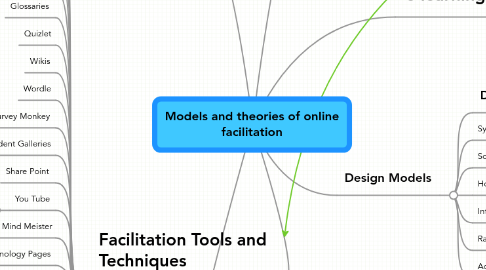Models and theories of online facilitation
作者:James Wanless


1. Facilitation Tools and Techniques
1.1. Blogs
1.2. Digital storytelling
1.3. Online writing resources
1.4. Cogdogroo
1.5. E-Portfolios
1.6. Glossaries
1.7. Quizlet
1.8. Wikis
1.9. Wordle
1.10. Survey Monkey
1.11. Student Galleries
1.12. Share Point
1.13. You Tube
1.13.1. teacher tube
1.14. Mind Meister
1.15. Terminology Pages
1.16. VoiceThread
1.17. Multimedia
1.18. Online “Ground Rules”
1.19. “Applause Corner”
1.20. Google Earth
1.21. Sketchup
1.22. Twiddla
1.23. Time Capsule
1.24. Research on cognition and multitasking
1.25. Wikipedia
1.26. mobile learning
1.26.1. New node
1.27. rss feed
1.28. Digital White boards and conferencing
1.28.1. Elluminate live
2. Learning Theories
2.1. Motivational Theories
2.1.1. Behavourism: Responding and Rewarding
2.2. Personality and Preference Theories
2.2.1. Transformative Learning Theory
2.2.2. MBTI
2.2.3. Emotional Intelligence Theory
2.2.4. Multiple Intelligence Theory
2.3. Developmental Thoeories
2.3.1. Phase/Stage Theories
2.3.1.1. Gender
2.3.1.2. Culture
2.3.2. Cognitivism: Acquiring Knowledge
2.3.2.1. Brain-based Learning
2.4. Social Learning and Constructivism: Constructing Knowledge
2.4.1. Society
2.4.2. Environment
2.4.3. Culture
3. New node
4. ian
4.1. • facilitators should engage the learner in the learning process, particularly at the beginning • use appropriate questioning, listening and feedback skills - and being able to communicate with various cultures • have the ability to provide direction and support to all learners of all cultures and backgrounds • have the skills in managing online discussions • know how to build online teams • have a capacity for relationship building • and have good motivational skill to get learners' motivated.
5. Design Models
5.1. Design Models
5.2. Systems Approach
5.3. Soft-System Approach
5.4. Holistic approach
5.5. Intuitive Approach
5.6. Rapid Instructional Design Model
5.7. Activity Theory
6. philosophies of e-learning:
6.1. role and view of technologies in learning, development, or achieving objectives
6.1.1. reflection
6.1.2. building community
6.1.3. collaboration
6.1.4. assessment
6.1.5. feedback
6.1.6. distribution of information
6.1.7. situated learning
6.1.8. experiential learning
6.1.9. information processing
6.1.10. information perceptions
6.1.11. personal development
